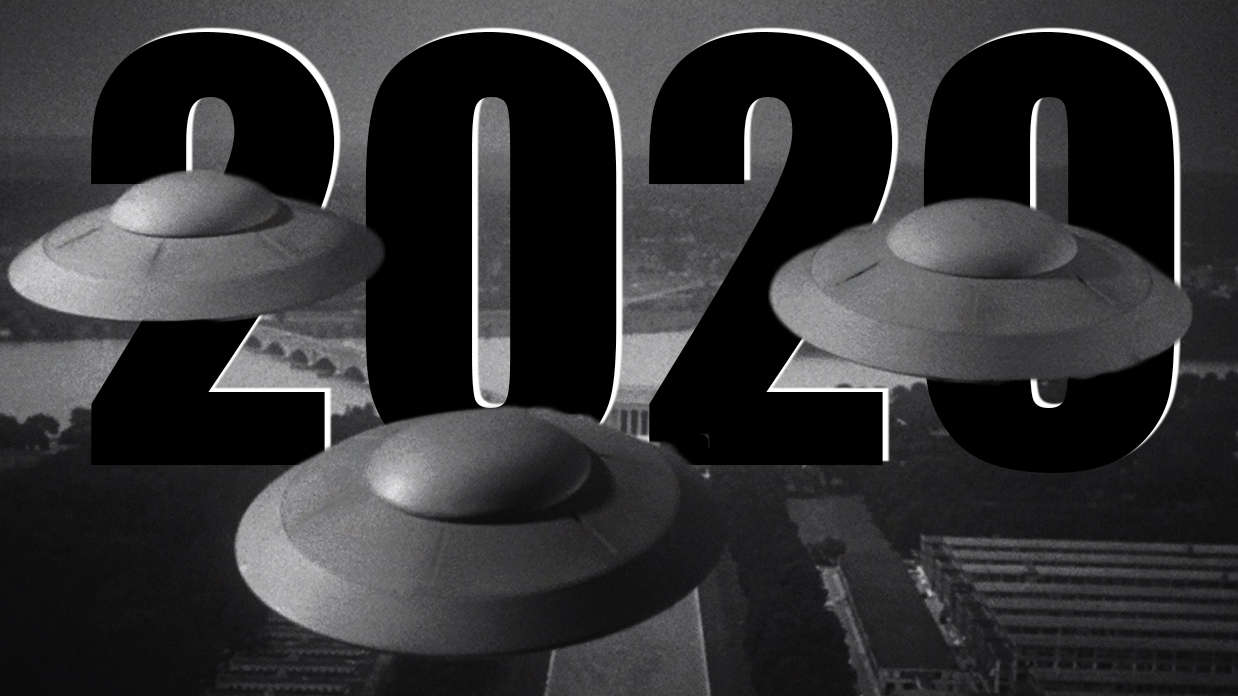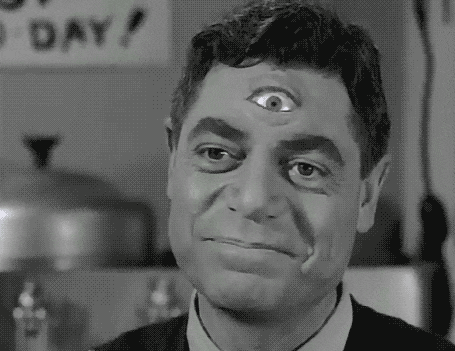Create a free profile to get unlimited access to exclusive videos, sweepstakes, and more!
What will alien and UFO stories look like after 2020?

The central task of storytelling is creating narratives and characters the audience can relate to, but there are few experiences less relatable than aliens — literally beings from a totally different world. So, to bring extraterrestrials down to earth, science fiction creators have found ways to apply contemporary issues and social woes to their outlandish tales, giving readers and viewers something to identify with even if they haven’t had a close encounter. No one has ever been stalked by the Predator or woken up to see a spaceship hovering over Los Angeles, but by grounding the story in a familiar political and social climate, writers and directors help the audience connect with the story through shared experiences.
"At its best, science fiction isn't about predicting the future,” says Connor Southard, co-host of the popular science fiction and fantasy podcast Podside Picnic. “It's about extrapolating what might happen based on the current moment."
In 2020, there’s a lot to extrapolate from, as the year has been uniquely jam-packed with events and phenomena that have the potential to drastically alter society. Inspired by reality, writers will surely match future works of alien-fiction to the world their audience knows, while omitting the sci-fi tropes that no longer seem realistic in a post-2020 world.
TRUTH IS STRANGELY RELATED TO FICTION
The parallel between alien fiction and current affairs isn't novel. In 1938, Orson Welles's radio broadcast of The War of the Worlds struck a nerve in a population deeply afraid of the military buildup of Nazi Germany, causing widespread panic. During the jovial post-war period, The Twilight Zone intrigued the public with tales of spooky and disturbing extraterrestrials — frequently examining issues like racism and paranoia, but never overstepped the nation’s standards with explicit displays of gore and violence.
But, as the post-war buzz faded into the Cold War, the image of creatures from outer space darkened. With television coverage of the Vietnam War, the 1968 Democratic National Convention riot, and the Manson Murders, Americans became accustomed to violence — and seeing it televised. This acceptance became an appetite, and by the 1970s, the kitschy, less overtly violent aliens of The Twilight Zone were replaced with the murderous creatures of John Carpenter's The Thing, The Predator, and the Alien franchise. Alien, which came out right at the end of the '70s, extrapolated the crumbling labor movement as a group of blue-collar workers were exposed to a lethal workplace hazard by the profit-focused Weyland-Yutani corporation.
With the Cold War over, The X-Files echoed the rising government skepticism of the 1990s as it posited the government was concealing proof of alien life. More recently, 2009's District 9 held a mirror to the 21st century's refugee crisis, while 2013's Dark Skies reflected America's fear of random violence, such as school shooters and terrorism.
Not only does using contemporary issues as a jumping-off point provide alien-fiction creators fresh ideas, but it has also inspired some of the most revered works of alien-fiction ever to grace our bookshelves and TV screens. With an understanding of this storied practice in mind, we can envision how creators will implement it after the extraordinary year of 2020.
A YEAR FOR THE BOOKS
As the dominant experience of the decade so far — and given its impact, perhaps beyond — the coronavirus pandemic is likely to be a major force in shaping coming works of science fiction, as it gives writers the perfect device to ground their narratives in relatable scenarios.
Fortunately for them, the alien-virus storyline has a history of pleasing science fiction fans. Michael Crichton’s best-selling novel The Andromeda Strain, which depicts a team of scientists battling the outbreak of an extraterrestrial pathogen, was successfully adapted into a 1971 movie and a 2008 miniseries. Oddly enough, a film adaptation of H.P. Lovecraft's alien-virus story The Colour Out of Space was released mere weeks before the U.S. started social distancing. Alternatively, in The War of the Worlds, a virus aided humanity as the common cold killed the alien invaders.
Going forward, audiences traumatized by the pandemic are unlikely to resonate with stories that overlook humanity’s newfound fear of diseases. "I think our view of how a first contact would go is changing,” says Peter Johannsen, Podside Picnic's co-host of how stories might change. “We've seen a lot of hand-shaking, even cheek-kissing. Now, we’ll be coy. 'Can we even come in contact?' That question has usually been assumed in sci-fi, but going forward I think we're not going to assume it."
Inseparable from the pathogen itself is humanity's response to it. Traditionally, alien invasion stories feature an initially outgunned humanity pulling together to defeat the evil invaders through expertise, competence, and international collaboration. However, with the pandemic exposing the flaws in American institutions, such as the shortage of personal protective equipment in hospitals and insufficient public relief packages, the traditional frame of “aliens are wrong, humans are right” might no longer be a given.
"This pandemic shows us, especially in the U.S., that our systems don't work the way they're supposed to," Southard explains. "I don't think you're going to see many more stories about: 'Here's an alien invader, and we need to defend our perfect way of life from them.' Instead, we'll see more stories questioning: 'Maybe this group has something to teach us. What can we learn from outsiders? How can we transform our way of living?'"
As presumed in 2016's Arrival, the pandemic has seen a breakdown in international collaboration. Going forward, the trope of nations uniting against an inhuman threat will likely be replaced with the more realistic scenario of nations acting in their own interest, whether that's learning from or fighting against the visitors.
Alongside showing effective international collaboration is unlikely, 2020 forces us to question the traditional storyline of humans uniting against alien foes. "I think we're going to see a lot of sci-fi about xenophobia and 'the threat within,'" Johannsen says.
Sci-fi has dabbled in the "alien collaborator" story before, but with CEOs and politicians openly stating they're comfortable sacrificing lives to save the economy, and a reinvigorated Black Lives Matter movement highlighting the U.S.'s gross inequities, storylines of privileged humans siding with aliens to exploit vulnerable communities are likely to resonate more than the wishful thinking of human unity.
To consider the extreme possibilities: One of the more unsettling developments of the year is the rise of QAnon, a far-right conspiracy group claiming, among other theories, that National Institute of Allergy and Infectious Diseases Director Anthony Fauci created COVID-19. Recent months have seen QAnon social media activity rise by 200 to 300 percent, but it’s not just faceless Twitter eggs supporting the theory. A presumptive U.S. Representative and the president himself have openly championed QAnon — a shocking affair even by 2020 standards.
Undoubtedly, the existential stress of the pandemic is behind some of QAnon’s explosion in popularity. "It's a cohesive, satisfying narrative that helps people explain a confusing, alienating world," Southard explains. Not only is QAnon bizarre, it’s dangerous: supporters routinely spread false information about the coronavirus, and one mailed pipe bombs to Democratic politicians.
QAnon’s rise is a perfect example to show that when faced with an existential threat, some humans will choose the personally comforting yet harmful narrative instead. As unsettling as it is plausible, the phenomenon of internet-based disinformation movements is sure to trickle into alien-fiction.
WHAT’S NEXT?
While cliche sci-fi stories tend to be little more than hodgepodges of laser blasts and exploding spaceships, the best works — the ones worth revisiting a century later — expand upon and explain their current moment. Humanity's response to alien contact is an unknown, rendering alien-fiction the perfect storytelling device to build a world where mankind's strengths, weaknesses, challenges, and questions can be explored to the extreme.
The extraordinary events of 2020 have changed our collective worldview. As it has before, and surely will again, alien-fiction will quickly adapt to keep its fantastic stories grounded in a relatable world.















